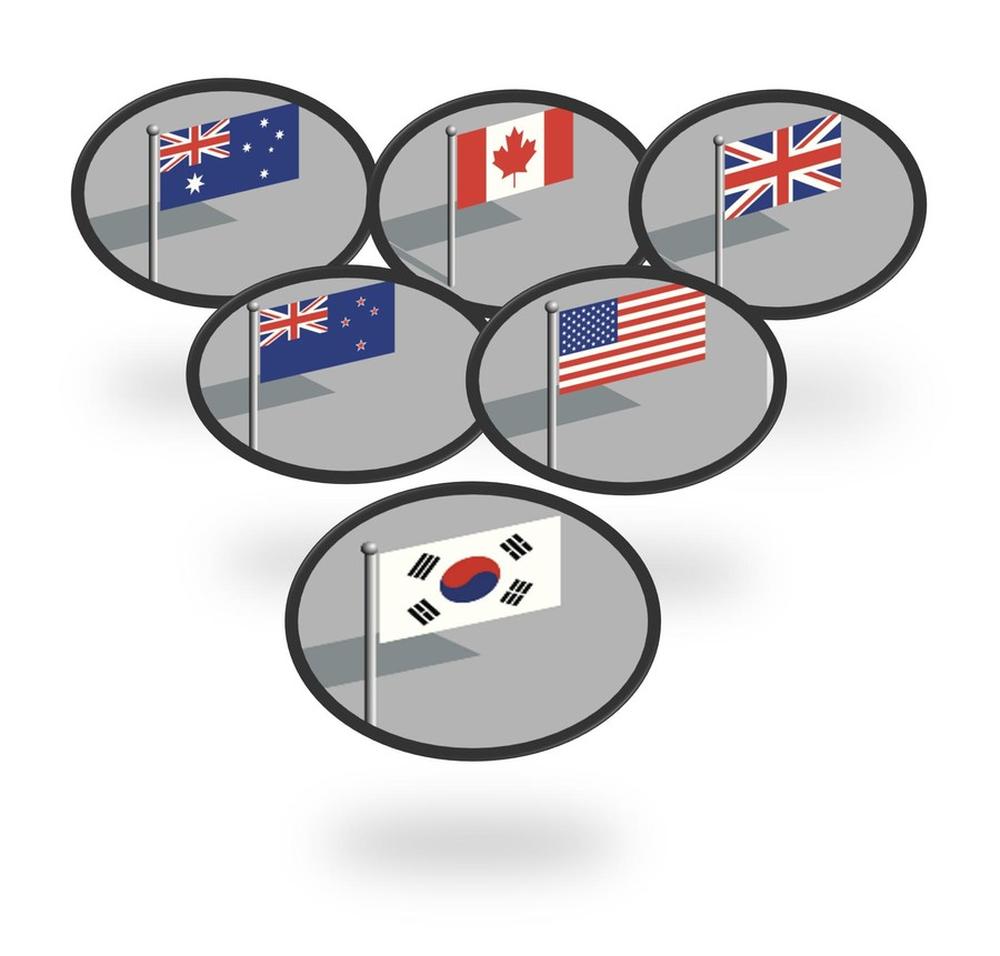- #Japan
- #Security & Defense
- #US-ROK Alliance

► Leaders in Washington and Seoul must be realistic that adding South Korea to Five Eyes is ultimately unlikely.
► Instead, the most important priority is to change mindsets by shifting from a focus on membership to a focus on mission.
► Seoul’s best opportunity for closer intelligence sharing is with its neighbors in East Asia, not the Five Eyes countries.
Should South Korea join the Five Eyes intelligence sharing network? A proposal put forward by legislators in the U.S. House of Representatives is triggering a discussion about that possibility. An amendment to the National Defense Authorization Act for Fiscal Year 2022 would require that the U.S. Director of National Intelligence provide a report to the armed services and intelligence committees on expanding intelligence sharing with South Korea as well as Japan, India, and Germany.
Adding countries to existing multinational groupings has been popular of late. The United Kingdom has tried to expand the G-7 into the D-10 by including South Korea, India, and Australia. Experts from the Quad countries—Australia, India, Japan, and the United States—have publicly discussed turning the Quad into a quint, potentially including South Korea, the United Kingdom, or others depending on the issue. Facing growing concern about the future of the region and international orders, it is only natural for countries to look for opportunities to tie themselves more closely together.
But leaders in Washington and Seoul must be realistic that adding South Korea (or others) to Five Eyes is ultimately unlikely. Yes – South Korea and the United States are close allies with many interests and values in common. And yes, they do already have robust bilateral (and sometimes trilateral) intelligence sharing efforts. But there are at least five major challenges that make South Korean membership in Five Eyes hard to imagine in the near-term.
First, the Five Eyes countries benefit from a common language and a shared historical connection rooted in British rule. South Korea and other potential additions to Five Eyes do not share these characteristics, which raises the bar for their efforts to join the group. The Five Eyes governments all operate in English (although not all exclusively), so adding Korea could complicate interoperability and potentially slow day-to-day cooperation. Overcoming this barrier might be relatively easy for the United States, but harder for other partners with less of a presence in Korea.
Second, the Five Eyes countries are all maritime powers, with the United Kingdom, Australia, and New Zealand being islands while Canada and the United States are sometimes described as surrounded by “friends and fish.” Thus, Five Eyes is largely focused on long-distance intelligence collection, effectively gathering intelligence from offshore and overhead on targets that are far away and often continental powers. On the other hand, South Korea’s primary concern—North Korea—is much closer to home and just across a land border, presenting a very different intelligence collection challenge.
Third, South Korea is unlikely to join Five Eyes without Japan, given that Tokyo has long expressed desire to join the grouping and has already attracted interest from several existing members. Fixing the troubled relationship between Seoul and Tokyo would probably be a requirement before South Korea could join Five Eyes, and perhaps Japan as well. But with a South Korean court having just supported forced divestment of a Japanese company’s assets in Korea, any improvement in the bilateral relationship seems as far away as ever, which would complicate efforts to expand Five Eyes.
Fourth, the Five Eyes countries share remarkably sensitive intelligence, which requires a high degree of trust among all the parties. South Korea has a close relationship with the United States, but ties with the other four Five Eyes members lag behind. To justify Five Eyes membership, South Korea would need to expand those relationships significantly. In other words, closer cooperation with the United Kingdom, Australia, New Zealand, and Canada would likely have to come before Five Eyes membership, not after.
Fifth and finally, it remains to be seen whether the Five Eyes countries would be satisfied that South Korean intelligence collection capabilities are sufficient to justify inclusion. Seoul would need to be willing to share intelligence on critical targets if it were to join Five Eyes – not just North Korea, but China as well. This could prove politically difficult, particularly given the close economic ties between China and South Korea, and could make Seoul a target of Beijing’s ire, just as was the case with the THAAD decision back in 2017. Many abroad would worry about Chinese pressure on Korea to accept a “fourth no” – no minilateral intelligence sharing on China.
For all these reasons, it is unlikely that South Korea will join the Five Eyes network in the near future. But that does not mean that South Korea and the United States cannot do more to expand their intelligence cooperation and information sharing with key like-minded countries. What more could be done?
The most important priority is to change mindsets by shifting from a focus on membership to a focus on mission. Right now the Five Eyes, the Quad, and the G-7 are all named for the number of their members. This is counterproductive. It would be better for these groups to have a fixed mission and flexible membership rather than fixed membership and flexible missions. Why? A central virtue of coalitions is that they can be flexible in form and function to better accomplish a specific mission. These groups are not formal alliances, so they should stay focused on particular issues and their membership should adjust to best meet this challenge, not vice versa.
With this in mind, it may not be that important that South Korea join Five Eyes at all. In fact, what Seoul needs most is closer cooperation with the technologically-advanced economies of East Asia. South Korea, the United States, Japan, Taiwan, and a handful of others would benefit tremendously from sharing information about how foreign pressure, surveillance, and theft threaten their economies and technology. Those governments should work together to share information on economic security concerns, in much the same way that the United States and South Korea (and ideally Japan) share information on regional security concerns.
South Korea is one of the America’s closest allies. It shares a wide variety of interests and values with the other Five Eyes countries as well. But the Five Eyes cannot, and should not, include everyone and do everything. Seoul’s best opportunity for closer intelligence sharing is with its neighbors in East Asia, not the Five Eyes countries. Coalitions should emphasize mission not membership and South Korea can lead the way. The Five Eyes may be shut, but the opportunity to build better issue-specific coalitions remains wide open.
Zack Cooper is a senior fellow at the American Enterprise Institute, where he studies US strategy in Asia, including alliance dynamics and US-China competition. He also teaches at Georgetown University and Princeton University, codirects the Alliance for Securing Democracy, and cohosts the “Net Assessment” podcast. Dr. Cooper is currently writing a book that explains how to predict the future path of US-China military competition by examining how militaries change during power shifts. Before joining AEI, Dr. Cooper was the senior fellow for Asian security at the Center for Strategic and International Studies and a research fellow at the Center for Strategic and Budgetary Assessments. He also served as assistant to the deputy national security adviser for combating terrorism at the National Security Council and as a special assistant to the principal deputy under secretary of defense for policy at the Department of Defense. Dr. Cooper graduated from Princeton University with a PhD and an MA in security studies and an MPA in international relations. He received a BA in public policy from Stanford University.

